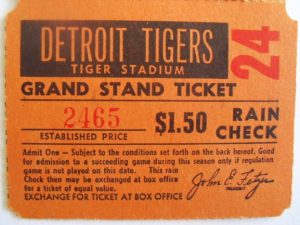Today’s idiom is neither violent, nor bloody. It comes from the world of poker and is used in the following discussion between two co-workers who are in the middle of some tough negotiations (Verhandlungen):
„Marion, I don’t know if we can get the seller to lower the price any more.“
„Why not? We’re the last company left in talks with these guys!“
„What? The other potential buyers pulled out?“
„Yeah – Robert was out for lunch today and overheard them talking. They’re done.“
„Well, that’s brilliant – why didn’t you tell me?“
„I wanted to leave that fact unknown for as long as possible. It’s our ace in the hole.“

In one form of poker, some of the cards are left face-down (ungedeckt) on the table. These cards are „in the hole.“ Imagine I have the hand shown above, and the ace is hidden. I have no idea that my hand will beat almost any other hand out there, and exactly that is the meaning of „ace in the hole“ – it’s any useful tactic or fact that remains hidden until it is used to the owner’s advantage.
In German, you would use the phrase „Ass im Ärmel,“ although that phrase suggests that playing the ace gives you an unfair advantage.





 This common British idiom comes from the longer phrase: „What you lose on the swings you gain on the roundabouts“ and is based on a poem by Irish writer Patrick Reginald Chalmers. It conjures the image of two fairground rides – the roundabout (similar to a carousel) and the swing. Both move without any actual change in location, they return to where they started. This image now stands for losses balanced by gains.
This common British idiom comes from the longer phrase: „What you lose on the swings you gain on the roundabouts“ and is based on a poem by Irish writer Patrick Reginald Chalmers. It conjures the image of two fairground rides – the roundabout (similar to a carousel) and the swing. Both move without any actual change in location, they return to where they started. This image now stands for losses balanced by gains. This American idiom comes from the earliest 20th century, when it had quite a different meaning. Back then, talking cold turkey meant to talk in a direct and no-nonsense way,
This American idiom comes from the earliest 20th century, when it had quite a different meaning. Back then, talking cold turkey meant to talk in a direct and no-nonsense way, 
 The term comes from the sacred white elephants that used to be kept by the kings and queens of Southeast Asia as symbols of justice, power, peace and prosperity. The white elephants were seen as objects of great opulence, very expensive but not particularly useful
The term comes from the sacred white elephants that used to be kept by the kings and queens of Southeast Asia as symbols of justice, power, peace and prosperity. The white elephants were seen as objects of great opulence, very expensive but not particularly useful